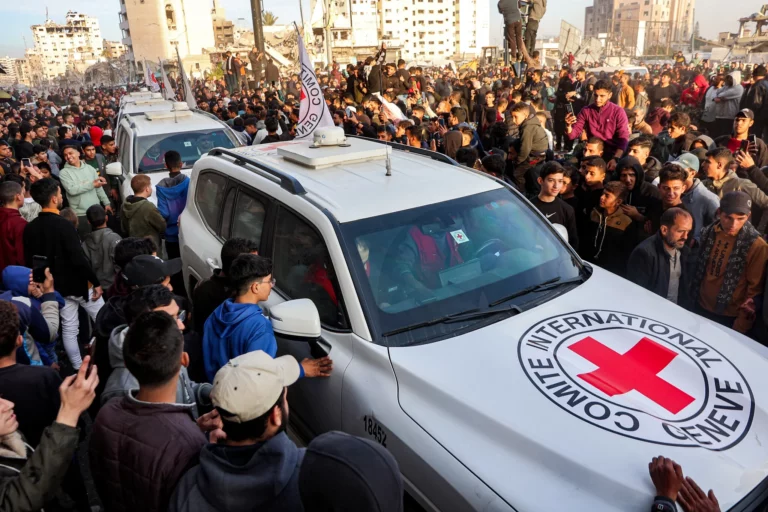The United States and Russia sought to lower the temperature in a heated standoff over Ukraine, even as they reported no breakthroughs in high-level, high-stakes talks on Friday aimed at preventing a feared Russian invasion.
Armed with seemingly intractable and diametrically opposed demands, U.S. Secretary of State Antony Blinken and Russian Foreign Minister Sergey Lavrov met in Geneva for roughly 90 minutes at what the American said was a “critical moment.”
But there was no apparent movement on either side, and Blinken said the U.S. and its allies remain resolute in rejecting Russia’s most important demands.
Nonetheless, Blinken told Lavrov that the U.S. would present Russia with written responses to its proposals next week and suggested the two men would likely meet again shortly after that.
With an estimated 100,000 Russian troops massed near Ukraine, many fear Moscow is preparing an invasion although Russia denies that. The U.S. and its allies are scrambling to present a united front to prevent that or coordinate a tough response if they can’t.
“We didn’t expect any major breakthroughs to happen today, but I believe we are now on a clearer path to understanding each other’s positions,” Blinken told reporters after the meeting.
Blinken said Lavrov repeated Russia’s insistence that it has no plans to invade Ukraine but stressed that the U.S. and its allies were not convinced of that.
“We’re looking at what is visible to all, and it is deeds and actions and not words that make all the difference,” he said, adding that Russia should remove its troops from the Ukrainian border if it wanted to prove its point.
Lavrov, meanwhile, called the talks “constructive and useful” and said the U.S. agreed to provide written responses to Russian demands on Ukraine and NATO next week. That could at least delay any imminent aggression for a few days.
But Lavrov declined to characterize the U.S. pledge.
“I can’t say whether we are on the right track or not,” he told reporters. “We will understand that when we receive the U.S. written response to all of our proposals.”
Moscow has demanded that the NATO alliance promise that Ukraine — a former Soviet republic — never be allowed to join. It also wants the allies to remove troops and military equipment from parts of eastern Europe.
The U.S. and its NATO allies have flatly rejected those demands and say that Russian President Vladimir Putin knows they are nonstarters. They have said they’re open to less dramatic moves.
Blinken said the U.S. would be open to a meeting between Putin and U.S. President Joe Biden, if it would be “useful and productive.” The two leaders have met once in person, in Geneva, and have had several virtual conversations on Ukraine that have proven largely inconclusive.
Washington and its allies have repeatedly promised “severe” consequences such as biting economic sanctions — though not military action — against Russia if an invasion goes ahead.
Blinken repeated that warning Friday. He said the U.S. and its allies were committed to diplomacy, but also committed “if that proves impossible, and Russia decides to pursue aggression against Ukraine, to a united, swift and severe response.”
But he said he also wanted to use the opportunity to share directly with Lavrov some “concrete ideas to address some of the concerns that you have raised, as well as the deep concerns that many of us have about Russia’s actions.”
Ukraine is already beset by conflict. Russia’s Putin seized control of Ukraine’s Crimea Peninsula in 2014 and backed a separatist insurgency in eastern Ukraine, part of a simmering but largely stalemated conflict with Ukrainian forces that has taken more than 14,000 lives. Putin faced limited international consequences for those moves, but the West says a new invasion would be different.
Ahead of his meeting with Lavrov, Blinken met Ukraine’s president in Kyiv and top diplomats from Britain, France and Germany in Berlin this week.
Adding to its repeated verbal warnings to Russia, the United States stepped up sanctions on Thursday. The U.S. Treasury Department slapped new measures on four Ukrainian officials. Blinken said the four were at the center of a Kremlin effort begun in 2020 to damage Ukraine’s ability to “independently function.”
The Russian Foreign Ministry reaffirmed its demands Friday that NATO not expand into Ukraine, that no alliance weapons be deployed near Russian borders and that alliance forces pull back from Central and Eastern Europe.
The State Department, meanwhile, put out three statements – two on Russian “disinformation,” including specifically on Ukraine, and another entitled “Taking Action to Expose and Disrupt Russia’s Destabilization Campaign in Ukraine.” The documents accused Russia and Putin of trying to reconstitute the former Soviet Union through intimidation and force.
The Russian Foreign Ministry mocked those statements, saying they must have been prepared by an Orwellian “Ministry of Truth,” and Lavrov caustically dismissed them.
“I do hope that not everyone in the State Department was working on those materials and there were some who were working on the essence of our proposals and their substance,” he said.
The Russian Foreign Ministry also rejected Western claims that Moscow was trying to rebuild the Soviet empire and carve out its zone of influence in eastern Europe, charging that it’s the West that thinks in categories of zones of influence.
Blinken has taken pains to stress U.S. unity with its allies in opposition to a possible Russian invasion, something that took an apparent hit earlier this week when Biden drew widespread criticism for saying retaliation for Russian aggression in Ukraine would depend on the details and that a “minor incursion” could prompt discord among Western allies.
On Thursday, Biden sought to clarify his comments by cautioning that any Russian troop movements across Ukraine’s border would constitute an invasion and that Moscow would “pay a heavy price” for such an action.
“I’ve been absolutely clear with President Putin,” Biden said. “He has no misunderstanding: Any, any assembled Russian units move across the Ukrainian border, that is an invasion.”
Russia on Thursday accused the West of plotting “provocations” in Ukraine, citing the delivery of weapons to the country by British military transport planes in recent days.
(AP)











